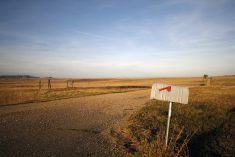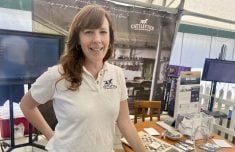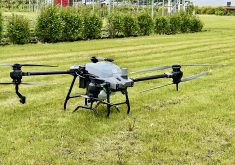I have been moving back and forth between the barn and the television the past week, keeping one ear tuned for news of fresh disasters.
My wife always turns on the kitchen television during periods of global calamity, which seem to occur with depressing frequency these days. For hurricanes, earthquakes, terrorist attacks and market meltdowns she tunes into CNN, which gives you the same quality of news you get at a barn fire. The talking heads have been droning on about the struggles in Washington to cope with the trillions of derivatives and credit default swaps floating about the global financial system. Despite a daily diet of this, she turns to me every time I come in and asks, “What does it mean for us?”
Read Also

Producers aren’t panicking over tariffs and trade threats
The Manitoba Canola Growers Association (MCGA) surveyed its members this spring to get a sense of how trade uncertainty was…
“Not much,” is my usual answer. We have more money invested in miniature Christmas houses than we have in credit default swaps. The rule is, most gloomy economic news that makes it to TV usually only means one thing to a farmer: if you’re buying you’ll pay more and if you’re selling you’ll get less.
In the meantime, I am building a fence. This is a late-season afterthought that is turning into one of the more pleasant tasks of the summer. The township plow dumps tons of snow on top of it every winter, which has smashed it flat so many times that I just gave up on it about five years ago. Now the little pasture it encloses is waist deep in orchard grasses and trefoil and crying out to be used again. Since the anchor posts at each end are still standing, I have decided to try a kind of suspension fence, with three strands of high-tensile electric. I’ll take the tension off when the snow comes and then just crank it up out of the grass in the spring.
I have stopped to rest on a fallen tree when my neighbour Vern Bunton drives slowly by above me and glances down at the fence project. He, too, is looking for sanctuary out of range of the television.
“Most people wait ’til the fence is up and then they let the cows out,” he says from the truck window. The steers are munching peacefully beside me, enjoying the Indian summer sun and this momentary drop in the wind off the lake. As long as I’m on the property, Parrish and Heimbecker don’t stray very far. They follow me around like dogs, watching for the blue pail of corn and mixed grain.
“But I guess you need the fence for insurance purposes,” says Vern. “Sure is a nice spot to work.”
It sure is. I think of the offices on Wall Street and the thousands of square miles of suburban subdivisions across the continent and wonder how I managed to find my way to this delightful corner of the world and call it home. The bulrushes are eight feet high and the undergrowth is a riot of orange touch-me-nots, black-eyed susans and purple fleabane. There isn’t a breath of wind or a bug in sight. Sitting on a fallen elm in the fall sunshine, it is difficult to imagine that anything could be wrong in the world anywhere.
Vern slams the door on the truck and slides down the bank to join me on my fallen elm tree for a visit. My wife, who had the house renovated so that she could monitor nine-tenths of the farm from her position at the kitchen sink, comes down ten minutes later through the orchard with a basket covered with a towel.
“What’s this?” says Vern. “The 100-mile lunch?” “More like a hundred yards,” she corrects him.
The sandwiches are constructed from the last ripe tomatoes in the garden, eggs from the henhouse and sprinkled with our own basil and onions. She has thrown in some apples and pears on her way through the orchard.
Vern sighs cheerfully. “Just think of the millions of people out there eating a stir-fry with a plastic fork in a mall food court. There’s one thing I’ll say for life on the land. It may be the last place where you can sit down in a marsh and eat like this and still say you’re at work. Can it be improved on?”
“A bottle of British beer?” suggested my wife. And so we had a picnic in the marsh with the cows.














